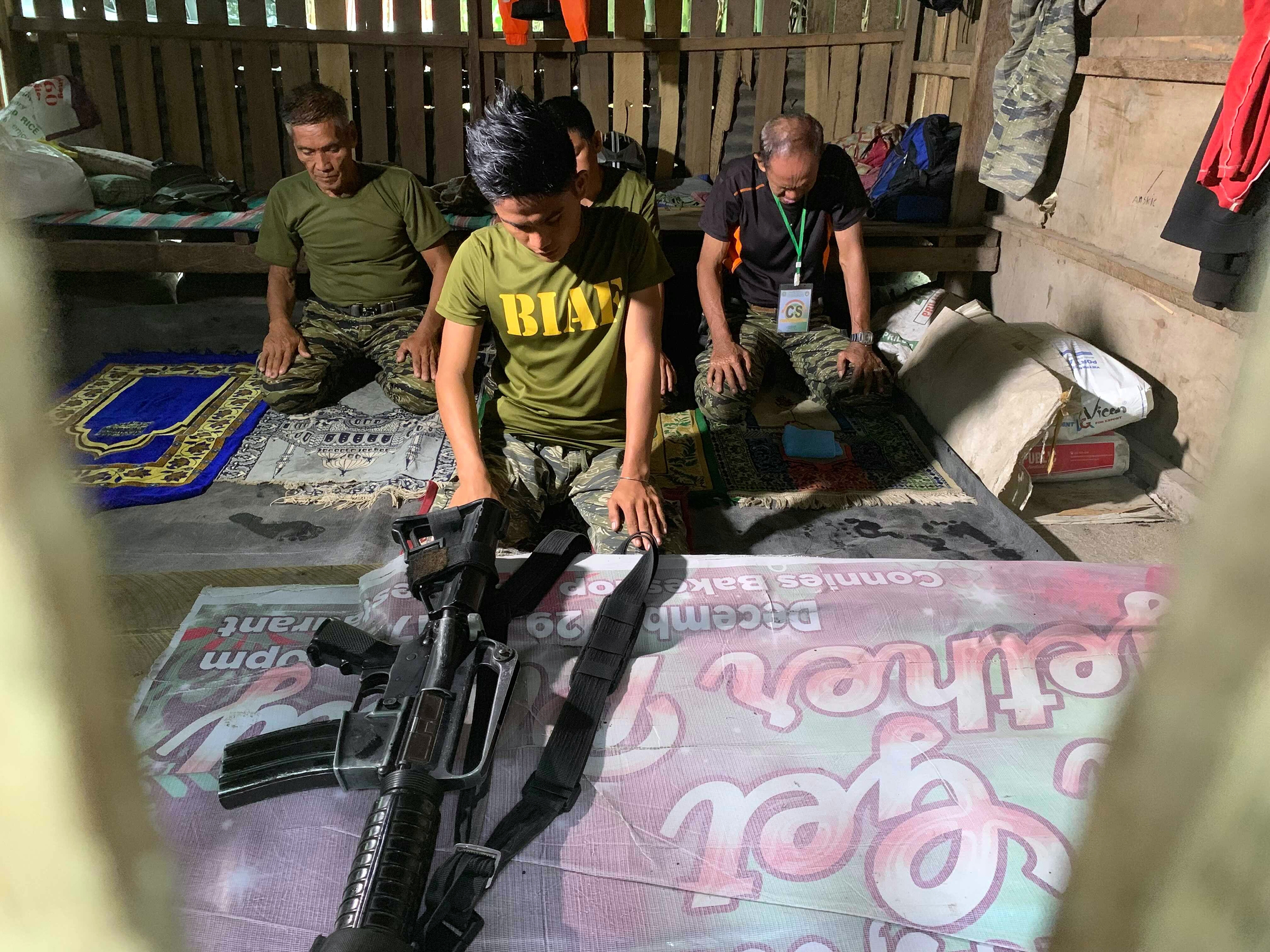
NEW HOPE FOR PEACE Moro rebels pray at their outpost in Sultan Kudarat town in Maguindanao on Saturday, a day after the Commission on Elections announced the ratification of the Bangsamoro Organic Law in the Jan. 21 plebiscite. —JEOFFREY MAITEM
The glimmer of peace in Mindanao and the people’s desperation to seek an end to the decadeslong turmoil that had hampered its growth seemed to have won approval for the law that would install a new self-governing Muslim region in the country’s south.
“The people are really tired of war. It is time to move forward,” Rep. Bai Sandra Sema told the Inquirer.
The Bangsamoro Organic Law (BOL), which was ratified in a plebiscite held on Jan. 21, is part of the fulfillment of the peace agreement signed in 2014 between the government and the Moro Islamic Liberation Front (MILF).
The Commission on Elections said yes won with 1,540,017 votes against 198,750 no votes in the Autonomous Region in Muslim Mindanao (ARMM).
In Basilan province, 144,640 voted to include Isabela, the capital, as part of the new region, overwhelming the 8,487 who were against it.
Isabela residents themselves, however, voted against inclusion 22,441 to 19,032.
Supporters of the BOL chanted “Allahu Akbar” (God is great) as they rejoiced over the yes win on Tuesday night in Cotabato City, which twice voted against joining the ARMM. The yes won narrowly with 36,682 votes against 24,994.
‘New chapter of peace’
The ARMM would now be replaced by the Bangsamoro Autonomous Region in Muslim Mindanao (BARMM).
In Manila, Sen. Sherwin Gatchalian was hopeful that the ratification of the BOL would mark the start of “an exciting new chapter of peace and progress in Mindanao.”
He said in a statement that the BARMM could become “a fertile ground for investment and inclusive economic development.”
“When there are more economic opportunities, the easier it will be for our less fortunate countrymen in the BARMM to rise out of poverty. I hope this serves as a catalyst for the continued progress and growth of the whole Mindanao,” Gatchalian said.
EU vows continuing support
Senate Majority Leader Juan Miguel Zubiri, who hails from Mindanao, agreed that more investments and higher economic growth could be expected in the BARMM and this, in turn, would spur people in the region to protect the peace they had won.
“If it becomes prosperous and the tourists come in, the residents themselves would watch over their areas,” he said in a radio interview. “They will police their own ranks.”
The European Union, which has been a staunch supporter of the peace process between the government and the MILF, providing substantial financial support to it, hailed the BOL’s ratification as a “significant milestone in the history of the Philippines.”
“The EU is prepared to continue to support the implementation of the BOL and to work closely with the relevant stakeholders toward long-lasting peace, development and prosperity for the benefit of Mindanao and the Filipino people,” it said in a statement.
Sweeping campaign
Sema believed that yes won partly due to the sweeping campaign by different nongovernment organizations, officials and President Rodrigo Duterte himself, who personally traveled to Cotabato City on the eve of the vote to rally support for the BOL.
The MILF also actively campaigned for ratification, saying the BOL was one way Moros who had been radicalized by the years of conflict that killed more than 120,000 people could be prevented from joining Islamic jihadists.
Sema said the President’s pitch for the BOL was not done by his predecessors in previous plebiscites in 1989, under the late Cory Aquino, and in 2001 for the creation of the expanded ARMM.
Naguib Sinarimbo, the secretary of the MILF political party United Bangsamoro Justice Party, said despite the strong campaign against the BOL, his group was confident of ratification by Cotabato City, because like the neighboring province of Maguindanao, it was considered an MILF stronghold.
Duterte factor
He said both the MILF and the Moro National Liberation Front boycotted the plebiscites in 1989 and 2001 on grounds that these did not represent the sentiment of the Bangsamoro people then, Sinarimbo said.
Amirah Lidasan, former chair of the militant group Suara Bangsamoro, agreed that the President’s endorsement of the BOL helped sway the vote in favor of ratification because of the pervading fear among the people in the city.
She noted that the plebiscite came after the New Year’s Eve bombing of South Seas Mall that killed two people and wounded dozens striking fear among the people in the city.
“The fear had nothing to do with the fight between the yes [and] the no vote. It’s not about the no attacking the yes or the yes attacking the no. It’s about what the government would do if Cotabato City would prove to be very hard to handle” and suffer the same fate as Marawi City, she said.
Sen. Aquilino Pimentel III, also a Mindanao native, said the people who rejected the BOL should respect the poll results.
“We thank them for sharing their sentiments,” he said in a radio interview. “By participating in the plebiscite, they did their obligation as citizens.”
Transition body
Pimentel said opponents of the BOL could criticize the law and monitor its implementation, but they should not derail it.
Under the BOL, an 80-member Bangsamoro Transition Authority (BTA) will run the regional parliament until the election of its first set of officials in 2022.
The MILF central committee has endorsed MILF chair Murad Ebrahim to lead the BTA.
The new region will receive an annual block grant, earlier estimated to be about P60 billion, that will be automatically appropriated in the national budget.
In addition, the national government will provide at least P5 billion per year for 10 years to the BARMM as special fund for rehabilitation and development. —With reports from Germelina Lacorte, Jerome Aning, Leila B. Salaverria, Bong Sarmiento, Edwin Fernandez, Sheila Mae Dela Cruz, Mart Sambalud and Inquirer Research